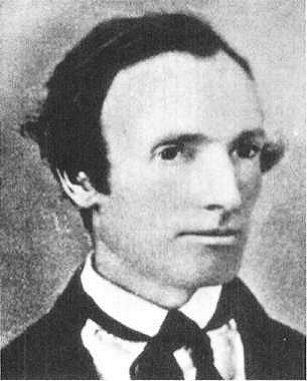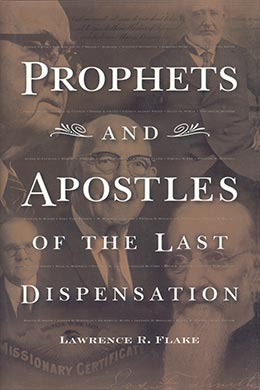Oliver Cowdery
Lawrence R. Flake, Prophets and Apostles of the Last Dispensation (Provo, UT: Religious Studies Center, Brigham Young University, 2001), 151–53.

Born: 3 October 1806, Wells, Vermont
Ordained an apostle by Peter, James, and John: May 1829 (age 22)
Second Elder of the Church: 6 April 1830
Assistant President of the Church: 5 December 1834 to 11 April 1838
Assistant counselor to President Joseph Smith: 3 September 1837
Excommunicated: 12 April 1838
Rebaptized: 12 November 1848
Died: 3 March 1850 (age 43), Richmond, Missouri
On 21 October 1848 at Kanesville, Iowa, a special conference was held among the Saints waiting to go to the Salt Lake Valley. The presiding officer, apostle Orson Hyde, called a speaker from the congregation who was unknown to most of those present. How surprised they were when the stranger announced, “Friends and Brethren: My name is Cowdery, Oliver Cowdery.” [1] Second only to the Prophet Joseph Smith in the leadership of the Church during its first eight years, Oliver had spent the past ten years disaffected and apart from the Saints. Now broken in health and subdued in spirit, he sought readmission to the Church, not as a leader but as a humble missionary, willing to bear testimony to the world of the things he had experienced.
These marvelous experiences began while, as a school teacher, Oliver boarded with the family of Joseph Smith Sr. and Lucy Mack Smith and learned of their son Joseph’s amazing work. Subsequently the Lord gave more than two dozen revelations to Joseph Smith concerning Oliver’s role in the restored kingdom. In addition, Brother Cowdery had the privilege of recording nearly all of the Book of Mormon as the Prophet translated it, of being shown the gold plates by the angel Moroni, and of hearing the voice of God declare the truth of the sacred record. He received the priesthood from heavenly messengers—John the Baptist and later Peter, James, and John. One of the six charter members of the Church, he was also one of the first missionaries of this dispensation and was appointed by revelation, as one of the Three Witnesses, to select the first Quorum of the Twelve Apostles. He stood next to the Prophet and jointly held the keys of the kingdom as assistant president of the Church. His experiences included witnessing the coming of heavenly messengers in the Kirtland Temple, among whom were Moses, Elias, Elijah, and even the Lord Jesus Christ.
Brother Cowdery’s fall from his important position was a result of personal weaknesses. As early as 1833 the Prophet recorded, “Blessed of the Lord is Brother Oliver, nevertheless there are two evils in him that he must needs forsake, or he cannot altogether escape the buffetings of the adversary.” [2] Joseph did not identify these evils, but one of them seems to have been pride. Shortly after the organization of the Church, the Lord warned Oliver to “beware of pride, lest thou shouldst enter into temptation” (D&C 23:1). On several occasions this weakness was manifested, including once when he wrote to Joseph concerning part of a revelation (D&C 20:37) with which he did not agree. He wrote, “I command you in the name of God to erase those words.” [3] He later accepted this revelation as the Prophet received it, but in 1838 at Far West, Missouri, he was excommunicated from the Church on a number of other charges arising from his pride.
During the decade he spent outside the Church, Oliver never denied the truth of the manifestations he had experienced; in fact, he often bore witness of their authenticity. A few weeks following his appearance in Kanesville, Oliver Cowdery was rebaptized and expressed his intention to go to Utah. Unfortunately his health failed and he died in Richmond, Missouri, 3 March 1850. David Whitmer, another disaffected witness of the Book of Mormon, living in Richmond at the time, later recalled: “Oliver died the happiest man I ever saw, after shaking hands with the family and kissing his wife and daughter, he said, ‘Now I lay me down for the last time, I am going to my Savior;’ and he died immediately, with a smile on his face.” [4]
Notes
[1] B. H. Roberts, A Comprehensive History of The Church of Jesus Christ of Latter-day Saints (Salt Lake City: Deseret News Press, 1930), 1:139.
[2] History of the Church, 1:465.
[3] History of the Church, 1:105.
[4] Millennial Star, 9 December 1878, 774; see also Stanley R. Gunn, Oliver Cowdery: Second Elder and Scribe (Salt Lake City: Bookcraft, 1962).
